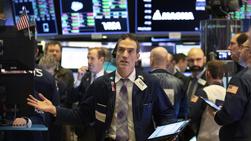 In this Feb 26, 2020, file photo, stock trader Gregory Rowe works at the New York Stock Exchange. (MARK LENNIHAN, FILE / AP PHOTO)
In this Feb 26, 2020, file photo, stock trader Gregory Rowe works at the New York Stock Exchange. (MARK LENNIHAN, FILE / AP PHOTO)
LONDON - Coronavirus panic sent World share markets crashing again on Friday, compounding their worst week since the 2008 global financial crisis and bringing the wipeout in value terms to US$5 trillion.
The rout showed no signs of slowing as Europe’s main markets slumped 2-3 percent early on and the ongoing dive for safety sent yields on US government bonds, seen as probably the securest asset in the world, to fresh record lows.
MSCI’s all country world index, which tracks almost 50 countries, was down over 1 percent once Europe opened and almost 10 percent for the week - the worst since October 2008.
MSCI’s all country world index, which tracks almost 50 countries, was down over 1 percent once Europe opened and almost 10 percent for the week - the worst since October 2008
ALSO READ: Chinese shares end higher Thursday
Wall Street shares had plunged 4.4 percent on Thursday alone which was its largest fall since August 2011. They have now lost 12 percent since hitting a record high just nine days ago, driving into so-called correction territory.
The CBOE volatility index , often called the “fear index”, jumped to 39.16, its highest in about two years, well out of the 11-20 range of recent months.
READ MORE: Hong Kong stocks close 0.31% higher
The index, which measures expected swings in US shares in the next 30 days, typically shoots up to around 50 when bear market selling hits its heaviest and approached almost 90 during the 2008-09 financial crisis.
In Asia, MSCI's regional index excluding Japan shed 2.7 percent. Japan's Nikkei slumped 4.3 percent on rising fears the Olympics planned in July-August may be called off due to the coronavirus.
Oil prices languished at their lowest in more than a year having plunged 12 percent this week - its worst since 2016 - while all the major industrial metals have dropped between 3 percent and 6 percent.


